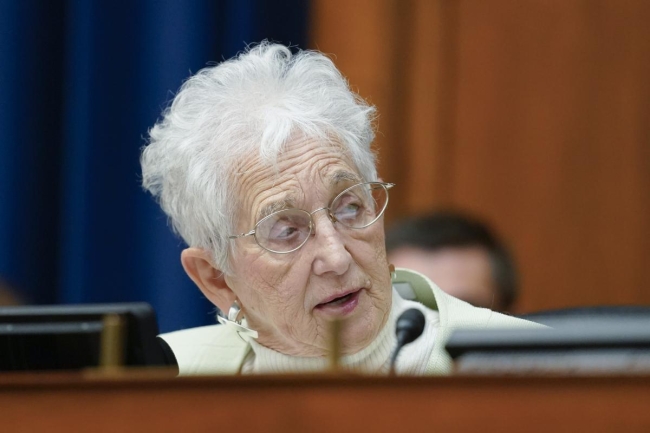You have /5 articles left.
Sign up for a free account or log in.

If Representative Virginia Foxx wins a 10th term, she’ll likely lead the House Committee on Education and Labor.
Andrew Harnik-Pool/Getty Images
Key federal lawmakers on education and appropriations committees in the House and Senate will likely be re-elected this November, but their decision-making power will depend on which party takes control of either chamber.
Election forecasters currently predict that Republicans will flip the House of Representatives, while control of the Senate is a toss-up with Election Day less than four weeks away, said Kyle Kondik, managing editor of Sabato’s Crystal Ball at the University of Virginia’s Center for Politics, which provides nonpartisan political analysis. Some think Democrats have a chance to hold the House.
So far, higher education lobbyists and policy experts expect a familiar face—Representative Virginia Foxx of North Carolina—to lead the House Committee on Education and Labor if the Republicans do in fact secure a majority. Who will lead the Senate Committee on Health, Education, Labor and Pensions is an open question with lawmakers retiring and moving to other leadership posts, but several expect a possible combination of Independent senator Bernie Sanders of Vermont, who caucuses with Democrats, and Republican senator Rand Paul of Kentucky.
“I think that combination seems unlikely to be a recipe for bipartisanship,” said Michelle Dimino, deputy director of education for Third Way, a center-left think tank.
Paul’s potential leadership of the HELP committee in 2020 concerned lobbyists and policy experts, who worried it would undermine the work of the U.S. Department of Education.
Thirty-five Senate seats are on the ballot across the country, along with the entire House of Representatives. Those include 14 Democrat-controlled seats and 21 Republican-controlled seats. The Senate is currently split 50-50, with Democrats in the majority.
“Anytime you go from one party controlling both chambers to the possibility of either split control or control of Congress, there’s big implications for what that might mean,” said Jonathan Fansmith, assistant vice president of government relations for the American Council on Education.
Foxx is expected to easily win her bid for a 10th term, Kondik said. Democratic representative Bobby Scott of Virginia currently chairs the committee, and he’s also expected to be re-elected. Foxx is a longtime member of the committee and a previous chairwoman.
“This is a committee she’s been the chair and the ranking member of for a long time,” Fansmith said. “She feels very passionate about it. She’s very committed to seeing policy goals implemented in the higher ed space and K-12 space. It’s not a shock that she would want to be there and would want to make her mark on the committee’s work.”
Foxx is likely to oppose everything President Biden wants and bring campaign rhetoric about the role of race in education to committee hearings. Foxx and other House lawmakers recently criticized what they said was a misuse of COVID-19 relief funds, citing one school district that, they said, used the money “to pay for radical curricula to indoctrinate students.”
Representatives Rosa L. DeLauro, a Democrat from Connecticut, and Tom Cole, a Republican from Oklahoma, who lead the House Education Appropriations Committee and the Republican contingent on the committee, are also seeking re-election. Election forecasters don’t consider those races competitive and expect both lawmakers to win.
On the Senate side, Republican senator Richard Burr of North Carolina is retiring this year, creating a vacancy at the top of the HELP committee. Democratic senator Patty Murray of Washington, who chairs that committee, is up for re-election this year.
Kondik said Murray appears to be doing well in her re-election bid. She’s consistently led public polling and won the August top-two primary with 52 percent of the vote. In that primary, the top two vote getters, regardless of party, advance to the general election.
If Murray does in fact win, lobbyists and policy experts say she’ll likely become the top Democrat on the Appropriations Committee. Democratic senator Patrick Leahy of Vermont, that committee’s top Democrat, is retiring at the end of this year, along with the Appropriations Committee’s top Republican, Senator Richard Shelby of Alabama. Senator Susan Collins of Maine is expected to take over for Shelby.
Collins would likely work well with colleges.
Murray’s switch to the Appropriations Committee would make Sanders next in line to chair the HELP committee. Meanwhile, Paul would be the committee’s highest-ranking Republican after Burr’s retirement, though Paul is also in line to lead the Senate’s Homeland Security Committee.
Like Third Way’s Dimino, Fansmith said a Sanders-Paul combination at the top of the committee could spell trouble for bipartisanship. Fansmith said education policy has typically been an area for collaborative, bipartisan cooperation.
“They are both strong senators,” Fansmith said. “Both have national profiles. Both are pretty strong partisan viewpoints that they are not shy about expressing. They’re pretty passionate advocates. They’re also very diametrically opposed views of what the appropriate federal role is.”




